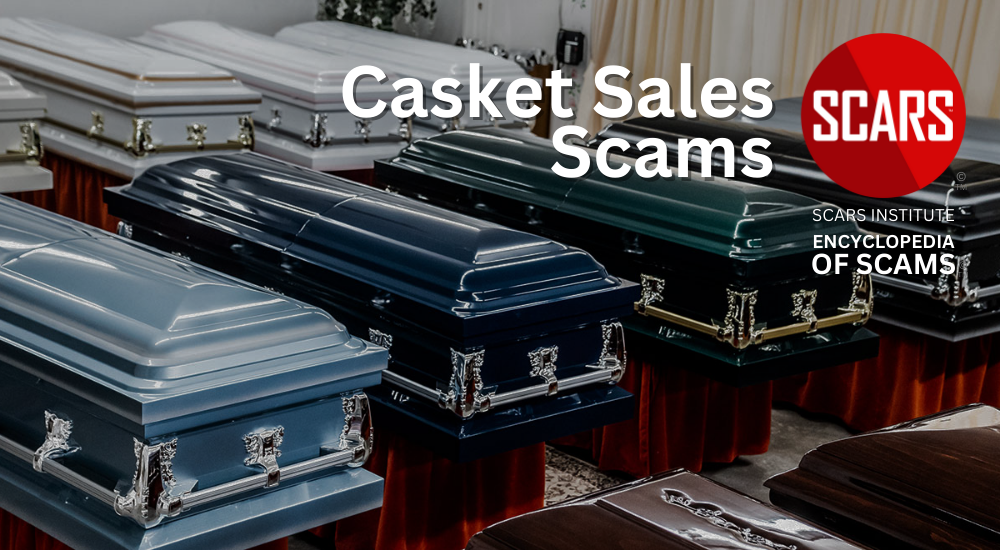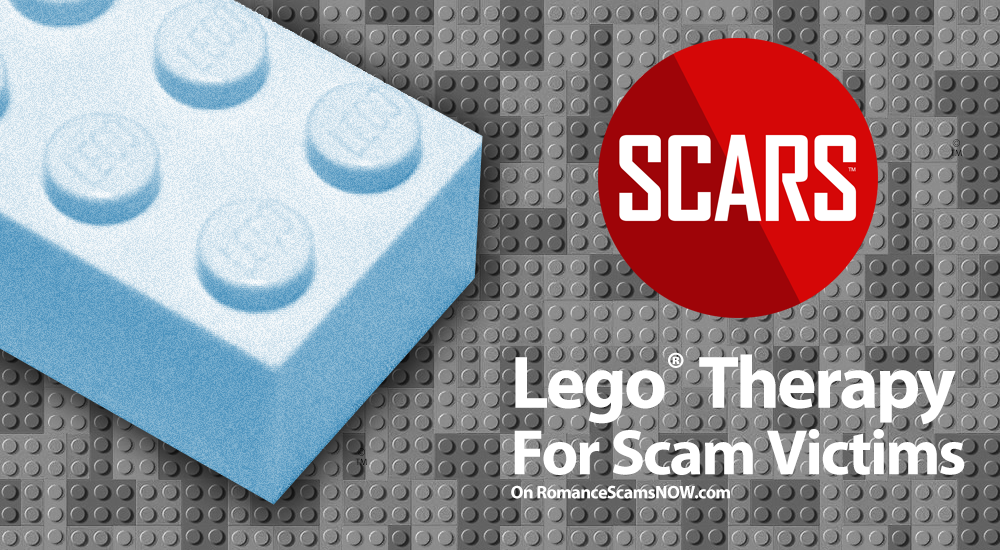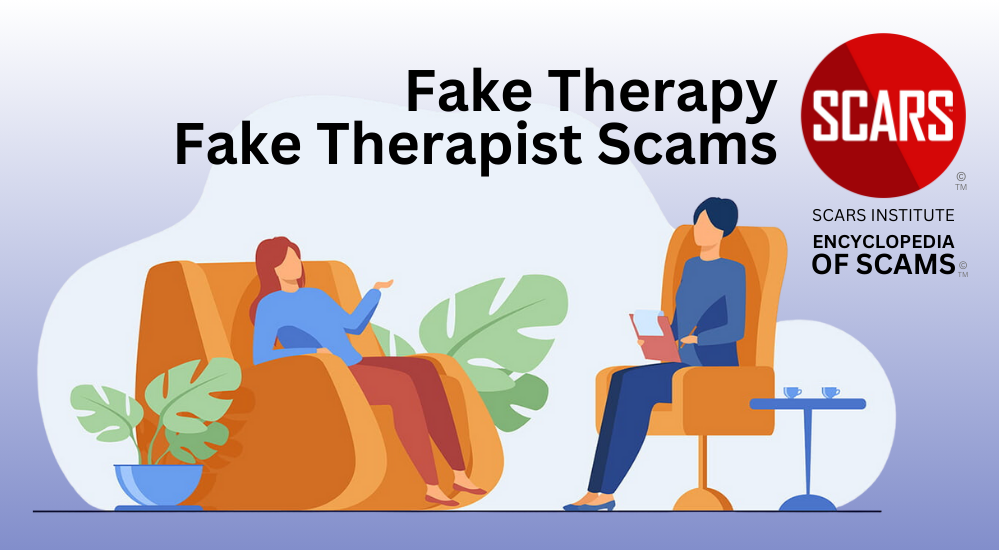
SCARS Institute’s Encyclopedia of Scams™ Published Continuously for 25 Years

SCAM WARNING: Fake Therapy and Therapists – a Scam Targeting Traumatized Scam Victims
Scammers Running Fake Therapy and Fake Therapist Services Now Target Individuals Who Have Already Fallen Victim to Other Scams!
How Scams Work – A SCARS Institute Insight

Authors:
• Vianey Gonzalez B.Sc(Psych) – Psychologist, Certified Deception Professional, Psychology Advisory Panel & Director of the Society of Citizens Against Relationship Scams Inc.
• Tim McGuinness, Ph.D., DFin, MCPO, MAnth – Anthropologist, Scientist, Director of the Society of Citizens Against Relationship Scams Inc.
Article Abstract
Scammers who run fake therapy services target previous scam victims due to their heightened emotional vulnerability, grief, and trauma. After experiencing betrayal, many victims are left isolated, emotionally overwhelmed, and searching for support to recover.
This state makes them more susceptible to follow-on scams, such as fraudulent therapy offers, as they seek quick resolutions or validation. Fake therapists exploit this by offering unlicensed services that manipulate the victim’s trauma, worsening their mental health while financially exploiting them. The lack of professional standards in these scams creates significant emotional and financial risks.

SCAM WARNING: How Fake Therapy Services & Therapists Target Previous Traumatized Scam Victims
Scammers running fake therapy, and fake therapist services now target individuals who have already fallen victim to other scams!
Scammers running fake therapy, and fake therapist services now target individuals who have already fallen victim to other scams, recognizing that these victims are emotionally vulnerable and seeking support. They use data from previous scams—sometimes obtained through data breaches or illicitly shared victim lists—to identify individuals who are likely to be in distress. By posing as legitimate therapists, they offer emotional recovery services, using deceptive tactics to manipulate victims into paying for non-existent therapy sessions. These scammers may promise healing from the emotional and psychological trauma inflicted by prior scams, playing on the victim’s need for closure and understanding.
Victims are frequently contacted through phone calls, emails, or social media platforms, where they are presented with personalized offers. The scammers may exploit the victim’s emotional state, convincing them that professional help is necessary to move on from their past trauma. Victims who are still processing the emotional damage from the previous scam are more likely to trust the fake therapists, especially when they feel desperate for support.
The Emergence of a New Scam
Scammers around the world view scam victims as a resource no different than an agricultural crop ready to harvest. They understand that once a person has been scammed they can be scammed over and over. Type re-scams included: money recovery scams, investigative or cryptocurrency-tracing scams, and now even therapy scams.
Why They Are Effective
Previous scam victims often feel isolated, guilty, or embarrassed, which makes them more susceptible to manipulation. These emotions can cloud judgment, causing them to overlook red flags such as requests for upfront payments or unverifiable credentials. Scammers may even claim to specialize in helping scam victims recover, adding a false sense of legitimacy to their deceit. By exploiting the victim’s desire to heal, fake therapy services manage to trap people in yet another cycle of fraud, causing further emotional and financial harm.
The Causes Behind Post-Scam Vulnerability
Scam victims are often more susceptible to follow-on scams due to several key factors, including:
Emotional Vulnerability: Victims are emotionally weakened after the first scam, making them easier targets for manipulation.
Desire for Resolution: The urge to recover lost money or resolve emotional distress leads victims to trust new offers quickly.
Trauma and Grief: Victims may be dealing with deep psychological trauma and grief after their experience, which clouds judgment and affects decision-making. Scammers exploit these emotions by offering help, but with ill intent. Trauma can impair cognitive functioning and lead victims to rely on quick fixes or external validation during recovery.
Broken Trust and Confusion: Victims often struggle with whom to trust, leaving them susceptible to false claims of help or recovery services.
Cognitive Overload: Dealing with the aftermath of a scam can overwhelm victims, leading to impulsive decisions.
Pre-existing Information: Scammers reuse personal data from previous scams, making the victims seem more familiar and trustworthy in follow-up fraud attempts.
Increased Susceptibility: The combination of these factors creates an emotional and psychological environment where victims are particularly vulnerable to being scammed again.
How the Fake Therapy or Therapist Scam Works
A fake therapy or therapist scam works by exploiting victims, particularly those who have experienced previous emotional trauma, such as from scams.
NOTE: The SCARS Institute offers therapy services through it’s partner BetterHelp.com – a real therapy services organization. They are a real, fully bettered mental healthcare services provider.
Here’s how it unfolds:
Targeting Vulnerable Victims: Scammers identify victims dealing with trauma or emotional distress, often from previous scams, and pose as professional therapists offering psychological help or therapy services. They can also find and target them in poorly managed social media groups that are not screening their members or are not private and secure.
Offering Quick Fixes: Scammers advertise emotional recovery or therapeutic solutions, often at lower-than-market rates or through unlicensed channels. They lure victims by promising quick solutions to mental health issues such as anxiety, depression, or trauma.
Phony Credentials: Fake therapists may present fabricated credentials, fake certificates, or even forge online reviews to build trust. They claim to be licensed professionals when, in reality, they have no formal qualifications. Always look up a therapist or provider in state/provincial registries to confirm they are licensed and real.
Requesting Payment Upfront: Victims are often asked to pay for services upfront through untraceable methods like wire transfers or gift cards. Once the payment is made, the scammer either delivers inadequate or no services at all. This is a ‘small-change’ scam where scammers steal a maximum of a few thousand but most of the time it is a few hundred to a thousand dollars or Euros.
Manipulative Tactics: Fake therapists may string victims along for as long as possible, making vague or empty promises about their emotional recovery, while extracting more money through follow-up sessions or extended treatments. In this regard, it is very similar to fake psychic scams.
Psychological Exploitation: By preying on the victim’s need for emotional healing, the scammer exacerbates the victim’s trauma, making it harder for the victim to discern the scam, as they may be desperate for any form of emotional support. Like the original scam, once the scammers have a ‘client’ they can use the same psychological manipulation, such as gaslighting to isolate and control the victim.
Inadequate or Dangerous Advice: In almost all cases, the advice given will be unprofessional, harmful, or entirely nonsensical, further endangering the victim’s mental health and prolonging their emotional suffering.
In the end, victims of these scams often lose more money and trust, and their emotional well-being may deteriorate, making recovery even more difficult. It’s crucial to verify the credentials of any therapist through legitimate sources before engaging in therapy services, especially online.
Who Are These Scammers
From the limited number of cases reported to us, we are seeing that they are worldwide. Latin American scammers are going after Spanish-speaking victims. Asian and Indian groups are going after these ethnicities in their languages. And of course, the Africans are in this game as well – specifically recruiting psychology students to play this role.
The Dangers of Unlicensed, Untrained, Uncertified Care
As you know, the SCARS Institute has trained and licensed psychological professionals on our team, though we do not provide mental healthcare, we use these skills, training, and certifications to best support and provide a path and process for recovery for scam victims. However, not all scammers are online or on the phone, there have been many examples of people pretending to be licensed therapists and seeing clients in real offices.
Dealing with fake or unlicensed therapists poses several significant dangers, particularly to those already vulnerable due to emotional trauma or distress. Some of the primary risks include:
Misdiagnosis and Harmful Advice: Unlicensed therapists lack the proper training to accurately diagnose mental health conditions, leading to ineffective or harmful treatment recommendations. This can worsen the individual’s mental health and delay genuine recovery.
Worsening of Trauma: Fake therapists can inadvertently, or intentionally, exploit the patient’s vulnerabilities, worsening their trauma through poor advice, unethical behavior, or emotional manipulation. In cases of scam victims, where trust has already been compromised, this further deepens emotional scars and makes recovery more difficult.
Financial Exploitation: Unlicensed therapists often charge exorbitant fees upfront or continuously pressure victims to pay for unnecessary services, preying on their desperation for help. Victims could lose significant sums of money for services that provide no real value or therapeutic benefit.
Invasion of Privacy and Data Theft: Fake therapists can exploit the personal and sensitive information shared during sessions, potentially using it for identity theft or other forms of fraud. The confidentiality that legitimate therapy offers is compromised, leading to even greater distress.
Delay in Receiving Proper Care: Relying on a fake therapist will delay access to appropriate mental health care. This means that individuals who need qualified, evidence-based treatment are stuck without proper support, allowing their condition to deteriorate further.
Lack of Accountability: In the case of scams, fake or unlicensed therapists are not held to any professional standards or regulations, there is no legal recourse or oversight. Victims of such scams have limited or no avenues to seek justice or compensation for the harm caused. However, if it is a local fake, then the police and state/province licensing boards can and will take action.
Engaging with fake therapists not only puts your emotional well-being at risk but also exposes you to financial, psychological, and privacy-related dangers. Always verify a therapist’s credentials through trusted professional bodies before engaging in treatment.
How to Protect Yourself as a Scam Victim
Verify Credentials: Always check a therapist’s licensing status through official psychological boards or trusted health websites.
Seek Recommendations: If you’ve been a scam victim, ask for recommendations from trusted sources like friends, family, or verified support groups.
Be Wary of Cold Approaches: Be skeptical of unsolicited offers, especially via phone, email, or social media.
Use Established Platforms: Choose therapy services through recognized and legitimate platforms that verify the credentials of their professionals.
Check Payment Practices: Legitimate therapists don’t demand large upfront payments without offering clear payment plans, and they accept secure, traceable payment methods.
By staying vigilant, victims can avoid falling into another scam trap during their recovery journey.
-/ 30 /-
What do you think about this?
Please share your thoughts in a comment below!
Table of Contents
- Scammers Running Fake Therapy and Fake Therapist Services Now Target Individuals Who Have Already Fallen Victim to Other Scams!
- Article Abstract
- SCAM WARNING: How Fake Therapy Services & Therapists Target Previous Traumatized Scam Victims
- The Emergence of a New Scam
- Why They Are Effective
- The Causes Behind Post-Scam Vulnerability
- How the Fake Therapy or Therapist Scam Works
- Who Are These Scammers
- The Dangers of Unlicensed, Untrained, Uncertified Care
- How to Protect Yourself as a Scam Victim
LEAVE A COMMENT?
Recent Comments
On Other Articles
- Arwyn Lautenschlager on Love Bombing And How Romance Scam Victims Are Forced To Feel: “I was love bombed to the point that I would do just about anything for the scammer(s). I was told…” Feb 11, 14:24
- on Dani Daniels (Kira Lee Orsag): Another Scammer’s Favorite: “You provide a valuable service! I wish more people knew about it!” Feb 10, 15:05
- on Danielle Delaunay/Danielle Genevieve – Stolen Identity/Stolen Photos – Impersonation Victim UPDATED 2024: “We highly recommend that you simply turn away form the scam and scammers, and focus on the development of a…” Feb 4, 19:47
- on The Art Of Deception: The Fundamental Principals Of Successful Deceptions – 2024: “I experienced many of the deceptive tactics that romance scammers use. I was told various stories of hardship and why…” Feb 4, 15:27
- on Danielle Delaunay/Danielle Genevieve – Stolen Identity/Stolen Photos – Impersonation Victim UPDATED 2024: “Yes, I’m in that exact situation also. “Danielle” has seriously scammed me for 3 years now. “She” (he) doesn’t know…” Feb 4, 14:58
- on An Essay on Justice and Money Recovery – 2026: “you are so right I accidentally clicked on online justice I signed an agreement for 12k upfront but cd only…” Feb 3, 08:16
- on The SCARS Institute Top 50 Celebrity Impersonation Scams – 2025: “Quora has had visits from scammers pretending to be Keanu Reeves and Paul McCartney in 2025 and 2026.” Jan 27, 17:45
- on Scam Victims Should Limit Their Exposure To Scam News & Scammer Photos: “I used to look at scammers photos all the time; however, I don’t feel the need to do it anymore.…” Jan 26, 23:19
- on After A Scam, No One Can Tell You How You Will React: “This article was very informative, my scams happened 5 years ago; however, l do remember several of those emotions and/or…” Jan 23, 17:17
- on Situational Awareness and How Trauma Makes Scam Victims Less Safe – 2024: “I need to be more observant and I am practicing situational awareness. I’m saving this article to remind me of…” Jan 21, 22:55
ARTICLE META
Important Information for New Scam Victims
- Please visit www.ScamVictimsSupport.org – a SCARS Website for New Scam Victims & Sextortion Victims
- Enroll in FREE SCARS Scam Survivor’s School now at www.SCARSeducation.org
- Please visit www.ScamPsychology.org – to more fully understand the psychological concepts involved in scams and scam victim recovery
If you are looking for local trauma counselors please visit counseling.AgainstScams.org or join SCARS for our counseling/therapy benefit: membership.AgainstScams.org
If you need to speak with someone now, you can dial 988 or find phone numbers for crisis hotlines all around the world here: www.opencounseling.com/suicide-hotlines
A Note About Labeling!
We often use the term ‘scam victim’ in our articles, but this is a convenience to help those searching for information in search engines like Google. It is just a convenience and has no deeper meaning. If you have come through such an experience, YOU are a Survivor! It was not your fault. You are not alone! Axios!
A Question of Trust
At the SCARS Institute, we invite you to do your own research on the topics we speak about and publish, Our team investigates the subject being discussed, especially when it comes to understanding the scam victims-survivors experience. You can do Google searches but in many cases, you will have to wade through scientific papers and studies. However, remember that biases and perspectives matter and influence the outcome. Regardless, we encourage you to explore these topics as thoroughly as you can for your own awareness.
Statement About Victim Blaming
SCARS Institute articles examine different aspects of the scam victim experience, as well as those who may have been secondary victims. This work focuses on understanding victimization through the science of victimology, including common psychological and behavioral responses. The purpose is to help victims and survivors understand why these crimes occurred, reduce shame and self-blame, strengthen recovery programs and victim opportunities, and lower the risk of future victimization.
At times, these discussions may sound uncomfortable, overwhelming, or may be mistaken for blame. They are not. Scam victims are never blamed. Our goal is to explain the mechanisms of deception and the human responses that scammers exploit, and the processes that occur after the scam ends, so victims can better understand what happened to them and why it felt convincing at the time, and what the path looks like going forward.
Articles that address the psychology, neurology, physiology, and other characteristics of scams and the victim experience recognize that all people share cognitive and emotional traits that can be manipulated under the right conditions. These characteristics are not flaws. They are normal human functions that criminals deliberately exploit. Victims typically have little awareness of these mechanisms while a scam is unfolding and a very limited ability to control them. Awareness often comes only after the harm has occurred.
By explaining these processes, these articles help victims make sense of their experiences, understand common post-scam reactions, and identify ways to protect themselves moving forward. This knowledge supports recovery by replacing confusion and self-blame with clarity, context, and self-compassion.
Additional educational material on these topics is available at ScamPsychology.org – ScamsNOW.com and other SCARS Institute websites.
Psychology Disclaimer:
All articles about psychology and the human brain on this website are for information & education only
The information provided in this article is intended for educational and self-help purposes only and should not be construed as a substitute for professional therapy or counseling.
While any self-help techniques outlined herein may be beneficial for scam victims seeking to recover from their experience and move towards recovery, it is important to consult with a qualified mental health professional before initiating any course of action. Each individual’s experience and needs are unique, and what works for one person may not be suitable for another.
Additionally, any approach may not be appropriate for individuals with certain pre-existing mental health conditions or trauma histories. It is advisable to seek guidance from a licensed therapist or counselor who can provide personalized support, guidance, and treatment tailored to your specific needs.
If you are experiencing significant distress or emotional difficulties related to a scam or other traumatic event, please consult your doctor or mental health provider for appropriate care and support.
Also read our SCARS Institute Statement about Professional Care for Scam Victims – click here to go to our ScamsNOW.com website.
















Thank you for your comment. You may receive an email to follow up. We never share your data with marketers.